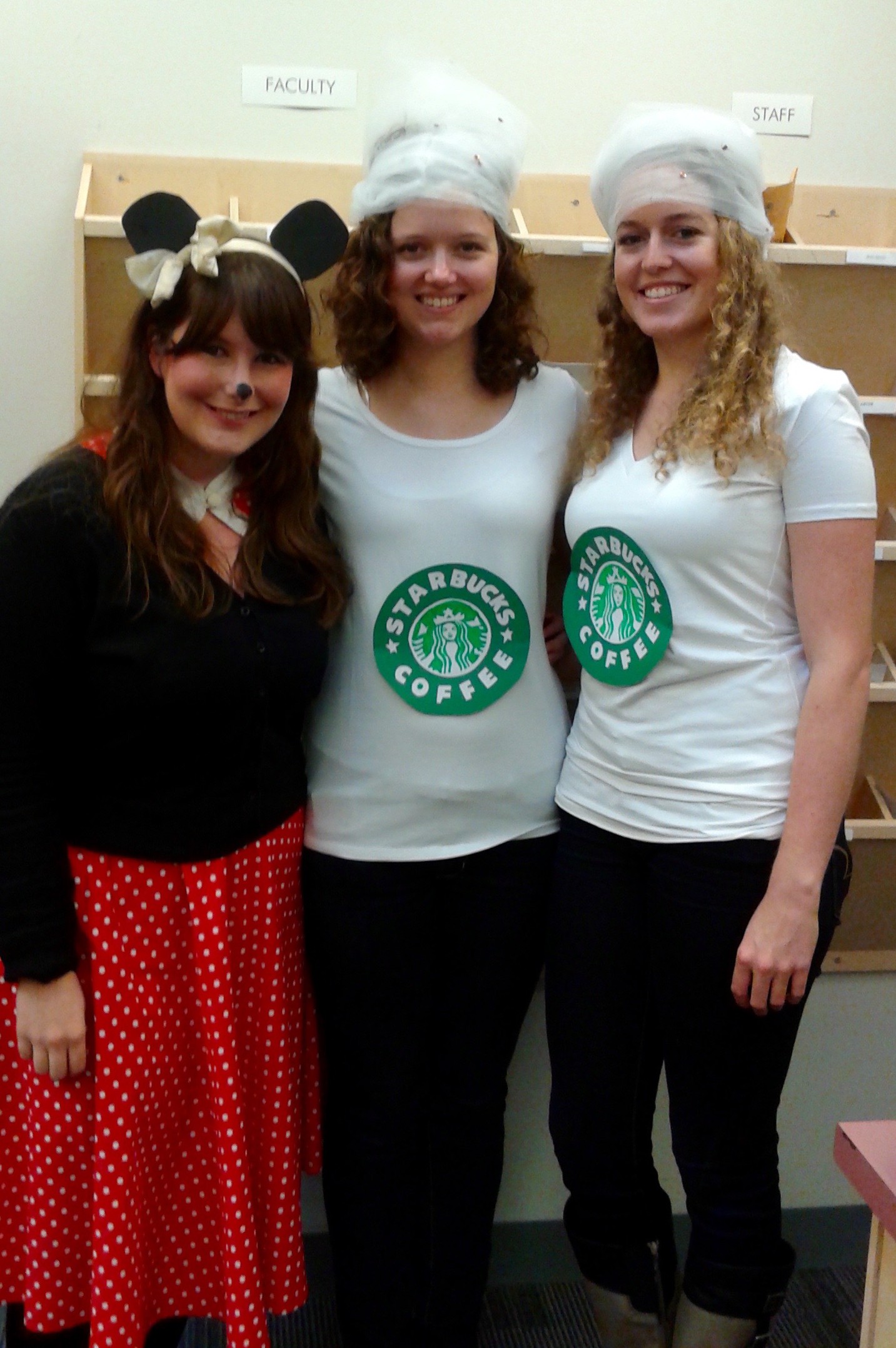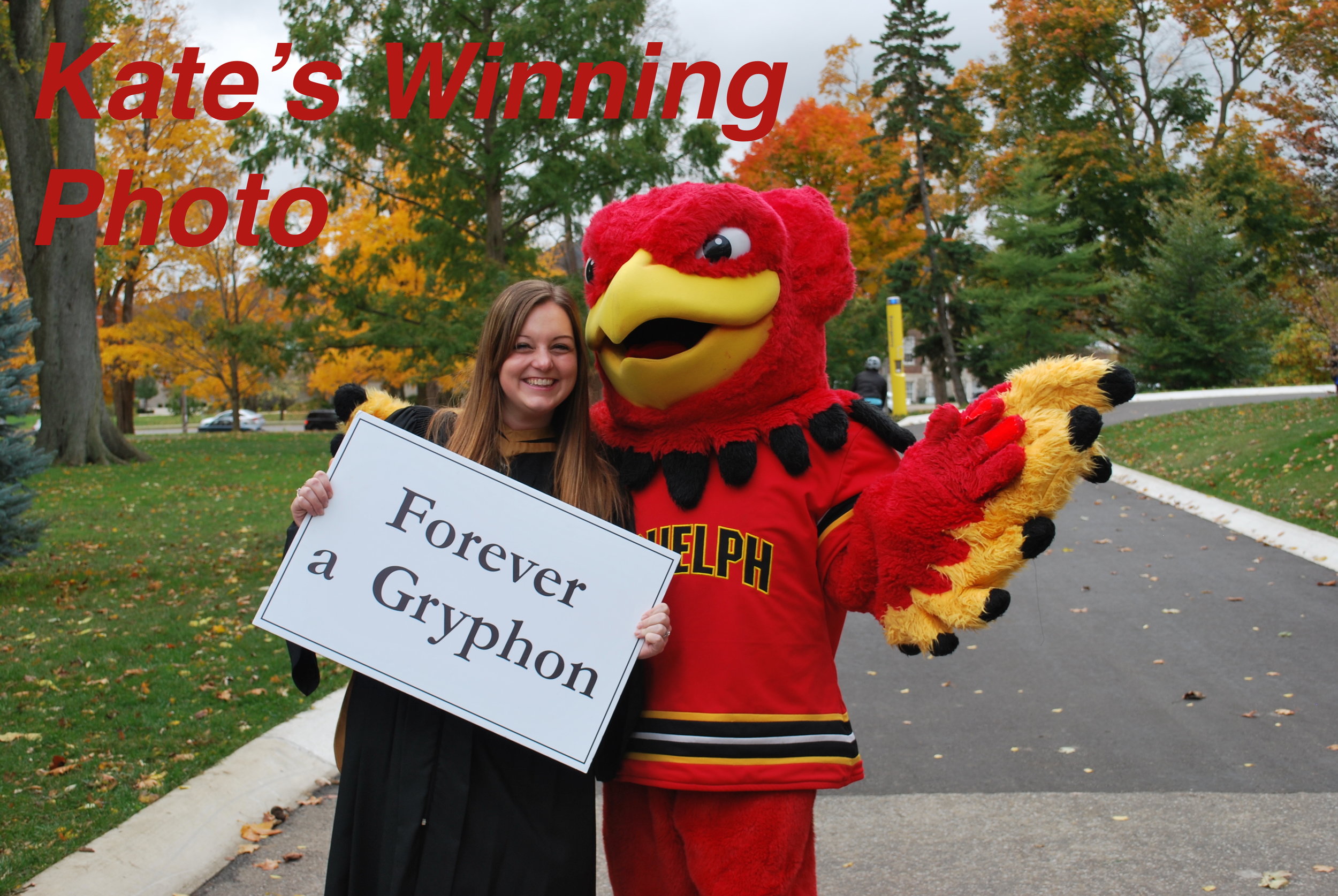New Publication - Agricultural Intensification Impacts on Health in SE Asia
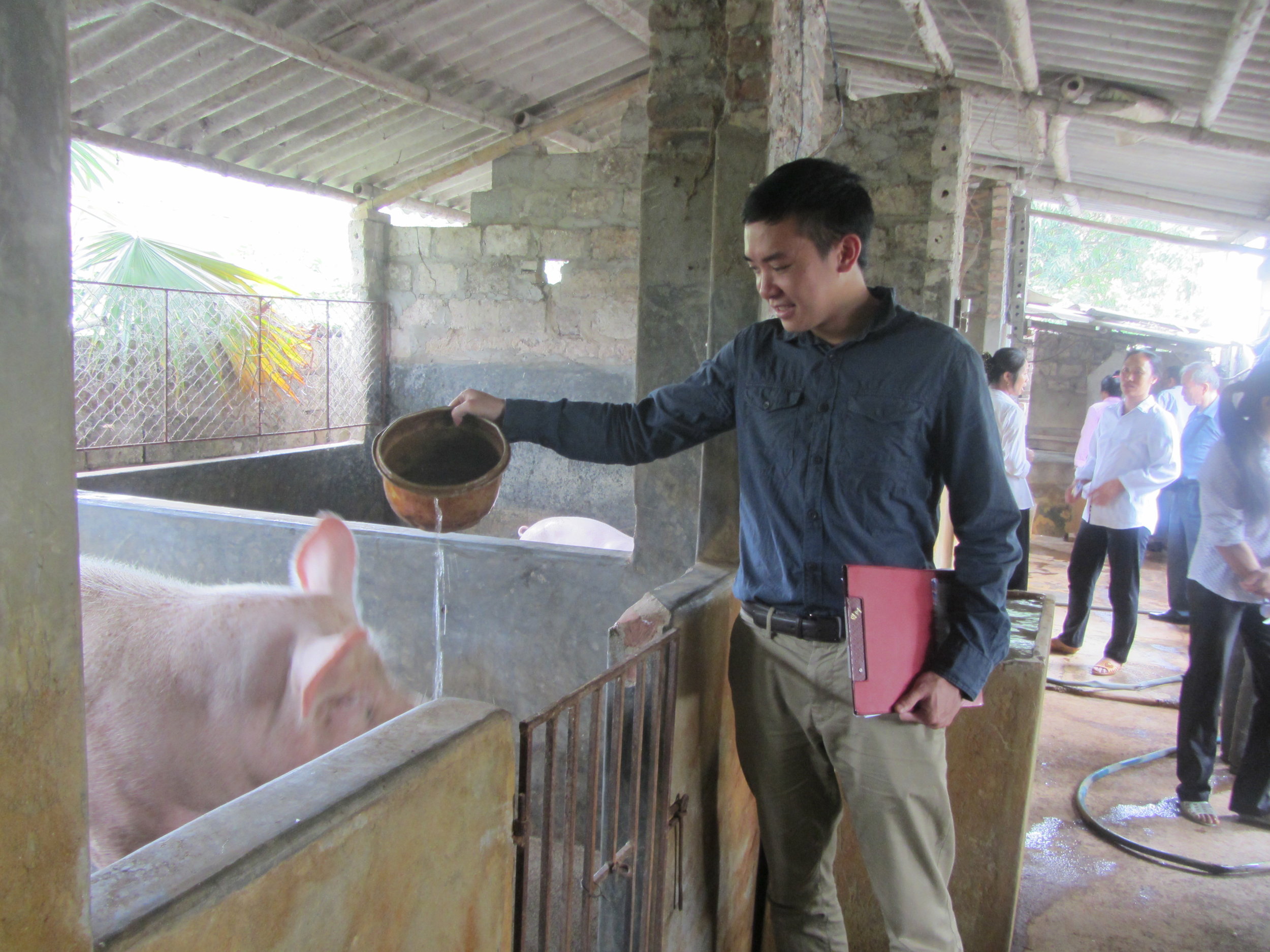 Congratulations to Steven Lam for his new publication! Steven collaborated with colleagues from Vietnam to conduct a scoping review on the impacts of agricultural intensification on human health in SE Asia! Click here for free open-access to the article.
Citation: Steven Lam, Hung Nguyen-Viet, Tran Thi Tuyet-Hanh, Huong Nguyen-Mai, and Sherilee Harper. Evidence for Public Health Risks of Wastewater and Excreta Management Practices in Southeast Asia: A Scoping Review. Int. J. Environ. Res. Public Health 2015, 12(10), 12863-12885.
Congratulations to Steven Lam for his new publication! Steven collaborated with colleagues from Vietnam to conduct a scoping review on the impacts of agricultural intensification on human health in SE Asia! Click here for free open-access to the article.
Citation: Steven Lam, Hung Nguyen-Viet, Tran Thi Tuyet-Hanh, Huong Nguyen-Mai, and Sherilee Harper. Evidence for Public Health Risks of Wastewater and Excreta Management Practices in Southeast Asia: A Scoping Review. Int. J. Environ. Res. Public Health 2015, 12(10), 12863-12885.
Abstract:
The use of wastewater and excreta in agriculture is a common practice in Southeast Asia; however, concerns remain about the potential public health risks of this practice. We undertook a scoping review to examine the extent, range, and nature of literature, as well as synthesize the evidence for associations between wastewater and excreta management practices and public health risks in Southeast Asia. Three electronic databases (PubMed, CAB Direct, and Web of Science) were searched and a total of 27 relevant studies were included and evaluated. The available evidence suggested that possible occupational health risks of wastewater and excreta management practices include diarrhea, skin infection, parasitic infection, bacterial infection, and epilepsy. Community members can be at risk for adverse health outcomes through consuming contaminated fish, vegetables, or fruits. Results suggested that practices including handling, treatment, and use of waste may be harmful to human health, particularly farmer’s health. Many studies in this review, however, had limitations including lack of gender analyses, exposure assessment, and longitudinal study designs. These findings suggest that more studies on identifying, quantitatively assessing, and mitigating health risks are needed if sustainable benefits are to be obtained from wastewater and excreta reuse in agriculture in Southeast Asia.
Reflections from “Creating a New Legacy”
Written by Alexandra Sawatzky, PhD student This week I had the honour of attending the 2015 Aboriginal Mental Health and Wellness Conference, “Creating a New Legacy,” in Brandon, Manitoba. The overall purpose of this two-day gathering was to promote and create culturally-safe services with and for Indigenous peoples, while encouraging Indigenous and non-Indigenous communities to work together with their heads, hearts, and hands. The tree from their logo represents what happens when Indigenous and non-Indigenous peoples come together as one to create a new legacy for the betterment of all. It implies that by establishing strong roots and a commitment to growing in our understanding, empathy, and respect for each other, the tree – and humanity – will flourish1. The core values of this conference were reflectiveness, responsiveness, relationships, and restoration, which resonated throughout the various presentations and sessions.
In the keynote address by Dr. Brenda Restoule, from Dokis First Nation and the Eagle Clan, emphasis was placed on the need to move towards proactive, strengths-based health programming models in Indigenous communities that focus on the gifts people already have – and help them use these gifts to move forward independently. Underlying these strengths-based models is the need for holistic approaches to healthcare that are developed, owned, and operated by Indigenous peoples. In order to do so, culture must be foundational.
In addition to strengths-based programming, Dr. Chandrakant Shah, Project Director of the Aboriginal Cultural Safety Initiative at Anishnawbe Health Toronto, stressed the importance of training healthcare providers in providing these programmes in culturally-safe way. Cultural safety is essentially the intentional act to recognize, respect, and nurture unique cultural identities. To be culturally safe, we must first prioritize empathy over compassion. Dr. Shah described compassion as infatuation, sympathy, or pity. Empathy, on the other hand, he described as the ability to walk in someone else’s shoes. Only after you’ve done this will you truly understand another person’s world and associated worldviews. Cultural safety also requires a deep understanding of the historical contexts, ongoing colonial processes, and racism that continue to impact Indigenous peoples today. Particularly for non-Indigenous individuals involved in various aspects of healthcare, this means engaging with decolonization processes in all work that is done alongside Indigenous partners.
Following Dr. Shah’s presentation, Dr. Michael Hart, who is from Fisher River Cree Nation and is the Canada Research Chair in Indigenous Knowledge and Social Work, provided further elaboration on cultural safety and decolonization. Dr. Hart began his presentation by unpacking the themes and processes of colonialism, stressing that colonial processes are two-way streets; while one party suffers, the other benefits. Those who benefit often have an internalized sense of power, and most aren’t able to recognize this, or else are too uncomfortable to do so. Culturally-safe approaches to healthcare services seek to break down these power imbalances, and recognize that there is more than one way of looking at the world. Such approaches require new skill sets and a new theoretical base – a move from “Indigenous” to “Indigenist” services. Dr. Hart explained that Indigenist services are centred around cultural revitalization for the political, social, and economic transformation of Indigenous peoples. This involves the re-setting of traditions and continued re-affirmation of the power they hold, can hold, and will hold. He ended with words that are shared by many Elders, which get at the very heart of Indigenous ways of being: “take what will help you go forward in a good way. Please leave the rest.”
I also had the pleasure of meeting with artist Eugene Ross, a descendant of the Sante Dakota Tribe, who has the largest Dakota collection in Manitoba. Mr. Ross took the time to show me how Dakota people made pemmican – a mixture of dried meat, fruits, and nuts pounded into a coarse powder and mixed with melted fat. [see photo below]
Although I learned so much from my brief time here, I recognize learning is never-ending and I have a long road ahead of me. Learning, to me, is about becoming. Becoming a better, wiser, more empathetic person. Becoming who you need to be. Learning can – and should be – an uncomfortable, challenging process. I find that it is when I am most uncomfortable with what I’m learning that I truly become more knowledgeable – about the worlds around me, and about myself. This knowledge, put into practice, can grow into wisdom. As Barry French, one of the planning committee members, so eloquently stated in his closing address: “with this knowledge, with these teachings, comes an obligation to do something with them. Take what you’ve learned here, put it into your heart, and use it. Share it with others. Create a new legacy.”
References:
- Creating a New Legacy. (2015). Conference Program. Retrieved October 8, 2015 from: http://creatinganewlegacy2015.ca/conference-program/
Camila and Paola Engaging with Shawi in the Amazon
Written by Camila Angarita, Undergraduate Research Assistant at the University of Guelph After long airport layovers I was able to make it to Lima, Peru. Here I met Dr. Paola Torres-Slimming (MD), a PhD Candidate whom I was going to assist while visiting the Shawi communities of Nuevo Progreso.
We arrived late at night to Yurimaguas after a one-hour flight and a three-hour drive over treacherous roads; this was the closest town to our final destination. The next day we took the opportunity to meet with stakeholders and authorities who have dealt with water-security matters around the region. These included the head of vicariate, NGOs, and members of the health ministry; the discussions allowed us to have better insight on the health-related issues that existed, before we entered the community.
Families who were gathered in “El Salon Comunal” welcomed us with great joy when we arrived, and of course lots of “Masato”- a traditional fermented drink made up of mashed boiled cassava. As I approached the women to greet them “Wikama Kai” bowls and bowls of Masato were given to me, as a gesture of appreciation. We introduced ourselves to the community and asked the community members if we could come back at a later date to collaborate on a research project about water security.
Every day was a completely different journey, you can never predict or expect anything when in the jungle. The long walks to reach the farther houses were enjoyable, especially when you fall several times, cross bridges made out of branches or get stuck in quicksand. I named the walks from one house to the next “the reflective walks”. We would always learn a fact, hear a story, analyze the last visit, or predict the new one.
I’m thankful for having this amazing opportunity as an undergraduate student, to being able to engage with community members in their remote community. This will allow me to have a better perspective on the community and will facilitate my work during my fourth year research project. A special thanks to Paola, Guillermo and Rosa for teaching me and sharing their knowledge throughout our time there.
Lindsay in Saskatoon at Integrated Training Program in Infectious Diseases, Food Safety and Public Policy
Written by Lindsay Day, MSc Candidate I recently had the opportunity to travel to Saskatoon to participate in the 4th International Summer School for the Integrated Training Program in Infectious Diseases, Food Safety and Public Policy (ITraP). ITraP is an interdisciplinary NSERC-CREATE program based at the University of Saskatchewan, and is founded on a One Health approach that encourages collaboration across disciplines to address and improve the health of people, animals and the environment, recognizing that these are interconnected.
The week-long Summer School is the final course-based component of the training, following an online problem-based learning course and an online student-led seminar course that were held over the winter term and early summer. In addition, students enrolled in the program arrange and participate in a 2-4 month externship in industry, government or academia, during the course of their graduate studies.
The theme of this year’s ITraP Summer School was team science, and provided an excellent opportunity for us to learn about collaborative science in action. We enjoyed presentations from speakers from Canadian, American, Indian and Australian academic institutions, as well as from those in industry and government. It was great to learn about team science from people with such diverse expertise, working in different fields and capacities to address a range of pressing One Health issues. Interactive sessions were also an important part of the Summer School, and covered topics in risk assessment, management and communication; communicating with policy makers; the dynamics of team science; CV preparation; grant writing; and media training.
With a focus on experiential learning, a team competition was also held as part of the Summer School. Over the course of the week we formed and worked together in international, interdisciplinary teams of 3-6 students to develop a letter of intent to apply for a grant to address a One Health issue of our choosing. Teams presented their proposals to a panel of peers (students and faculty) at the end of the Summer School, with the top two placing teams receiving seed funding to assemble a full application. (Our team ended up being one of them!).
Overall, this action-packed week was a great experience and valuable learning opportunity. Perhaps most important of all, it provided a chance to meet, in-person, fellow students from the online components of the program. We are a diverse group, with students coming from Brazil, India, South Africa and across Canada to take part in the Summer School (unfortunately our colleagues in Germany were unable to join us). It’s been wonderful learning from everyone in the ITraP program, and these are connections I am sure we will maintain as we move forward in our academic careers and beyond.
Update from Vivienne and Sarah in Uganda
Written by Vivienne Steele, MSc Candidate We have wrapped up our seven weeks in Bwindi, Uganda and are now settling back into life in Canada. The final weeks were a flurry of data entry and sharing results with local partners but we managed to finish everything we needed to do.
Our biggest challenge was completing the data entry from the maternity records, but with some help from the wonderful records department staff, we were able to finish entering the complete set of records. The hospital IT staff were pleased with this contribution and we hope it will be helpful to a number of hospital staff in their research.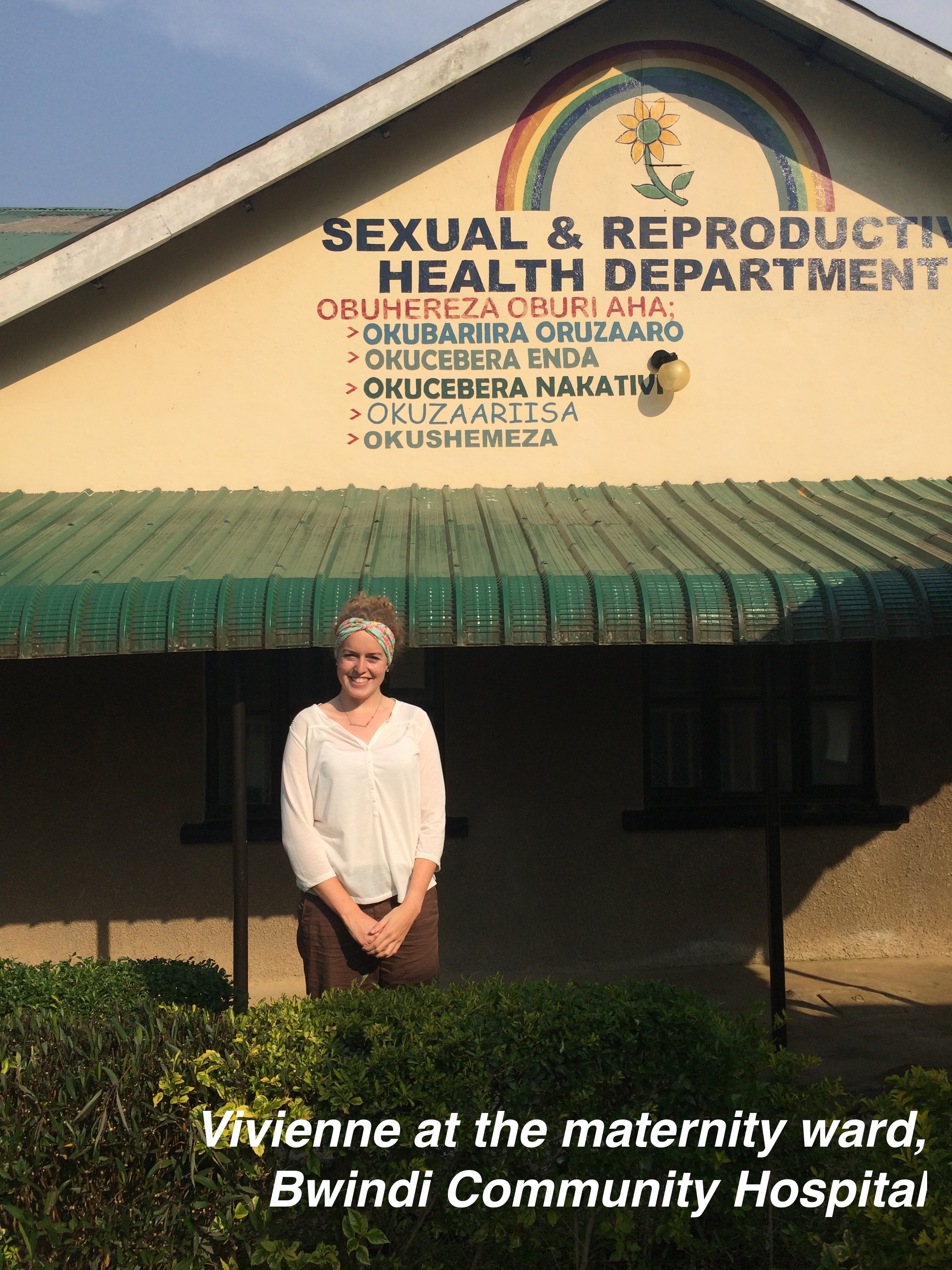
One evening as we were working late entering records, we got the call we had been awaiting—there was a birth happening on the ward and we were invited to come and assist with the procedure! Cradling this brand new creature moments after it entered the world and tying off the umbilical cord put into perspective everything we have been working on. The experience made it starkly apparent why facility-based deliveries can be so important - the nurse was concerned about postpartum hemorrhaging. Fortunately the sutures held and the mother was able to sit up and meet her baby girl. As the nurse entered the birth information in the record, she asked for our names—we are now listed as having assisted during the birth on the very records we have spent weeks entering.
In our second last week in Buhoma our friend Levi from BDP guided us on the Batwa Experience tour. We headed up a steep mountain path and were welcomed by a traditional dance by several Batwa men and women, who then demonstrated honey-harvesting, hunting practices, and medicinal plant identification. Learning more about the traditional way of life for the Batwa in the forest contrasted greatly with what we saw on our community visits to their new settlements. The preservation of traditional knowledge through the Batwa Experience is an important initiative, but it also reminded us how many traditional food sources were lost when the Batwa were evicted from the forest.
On our final day, we held a preliminary results sharing meeting at the hospital, where 40 BCH staff were in attendance. It was a great chance for us to give a summary of IHACC, our projects, the work we had been able to accomplish while at BCH, as well as next steps. We also gave an overview of the health records evaluation draft. Our presentation was well received, and the staff were eager to review the soft copies of the evaluation that we distributed. Many people offered some great feedback and questions about the direction of our research.
We will miss BCH, Bwindi, and the many connections and friends we have made in Uganda. However, we are looking forward to continued collaboration with our Ugandan partners as we develop our projects over the coming months. We are very grateful to all who have helped us and feel fortunate to have had this experience. This time has reminded us both of the value of fieldwork; it has grounded our research in real-life experience and motivated us to make our research useful and relevant for BCH and the communities we have been working with.
Congrats to Kate Bishop!
Congratulations to Kate Bishop! Her IHACC research was profiled by the University of Guelph in an article entitled "Global climate change affecting indigenous people, at home and abroad." To read the article, click here.

Kate Bishop-Williams Wins Photo Competition
Congratulations to Kate Bishop-Williams for winning the Graduate Studies Photo Competition. Kate won 2nd place in the Student Life category for her photo “Forever a Gryphon”, which was a great picture that showed the joy and pride of being a Guelph graduate student.
The prize included $200, which was credited towards her tuition.
Congrats Kate!
Inaugural Harper Lab Retreat!
Written by Carlee Wright & Manpreet Saini
 On Thursday August 13th and Friday August 14th, members of Dr. Harper’s lab went to Creiff Hills Community Retreat and Conference Centre for a 2-day overnight retreat. Thursday morning we left bright and early to the place that would be our residence- the House of Ruth. Our day started with a yoga session. We completed stretches and exercises to prepare us for the activities and events to come. Following the relaxing yoga session, we participated in a teleconference with Dr. James Ford from McGill University. He discussed topics such as writing, productivity, and grant proposals. He addressed questions we had in regards to graduate student work as well as building a strong CV.
On Thursday August 13th and Friday August 14th, members of Dr. Harper’s lab went to Creiff Hills Community Retreat and Conference Centre for a 2-day overnight retreat. Thursday morning we left bright and early to the place that would be our residence- the House of Ruth. Our day started with a yoga session. We completed stretches and exercises to prepare us for the activities and events to come. Following the relaxing yoga session, we participated in a teleconference with Dr. James Ford from McGill University. He discussed topics such as writing, productivity, and grant proposals. He addressed questions we had in regards to graduate student work as well as building a strong CV.
During the lunch period we took advantage of the beautiful weather to sit outside. The afternoon activities started with a walk along the Red Trail on the property and participating in an adaptation of a water walk. This activity involved stopping at various points along the walk and reflecting on how we are affected by the immediate natural and/or built environment. We discussed how these spaces made us feel as well as different topics of discussion that were coming up as we spent time walking with one another. The trail covered a wide range of scenery as we moved between forested areas and cornfields. The views were breath-taking, and a fresh change from the sights and sounds of the city we are so used to. The opportunities to stop and reflect also gave us the chance to share things about one another and learn new things about each other. Making our way back, we participated in a sharing circle that covered topics such as being non-Indigenous but working with Indigenous populations. As always, the sharing circle provided us with a safe space to express thoughts, share stories and state what was on our minds.
On Thursday afternoon we had Natalie Carter, a soon-to-be PhD graduate, speak to the group. Natalie joined us to talk about gender-related research, and some of the opportunities and challenges related to conducting gender research in different countries and cultures. This was a great opportunity to learn and share experiences that students have faced in their own research. After the planned sessions, we enjoyed a chilli dinner and had a campfire complete with hot dogs and s’mores. Several of us even saw meteors from the Perseid meteor shower!
Friday morning started off with another sharing circle that covered topics such as staying motivated and time management tips. PhD candidate Warren Dodd then did a great session that covered concepts that we are exposed to in research with Indigenous populations, methods that we use within research, and values that we hold as researchers. Throughout his session we were able to reflect on these various components of research and discuss what our thoughts and perceptions were of each. Furthermore, we were given the opportunity to reflect on our most important values within ourselves and how the concepts and methods align with and impact our work. It was a very interesting session that really got us thinking of how our values intertwine with the research that we do, and hope to do in the future.
The retreat ended with an amazing pizza lunch and a final opportunity to mingle. The retreat was a great opportunity to spend time with each other, as we are not always able to when at the university. Overall, it was a phenomenal experience and I’m sure all of us cannot wait for the chance to repeat it next year.
Update from the Collaborative Arctic Seminars in Epidemiology course in Yellowknife, NWT
Written by Kate Bishop-Williams Last week, Carlee, Lindsay, and I had the pleasure of attending the Collaborative Arctic Seminars in Epidemiology course in Yellowknife, NWT from August 3rd-7th, 2015.
The course was hosted by the University of Alberta, and open to PhD and MSc/MA students from the circumpolar countries. Representative from Canada, USA, and Norway were a part of both the student and teaching teams.
We arrived in Yellowknife on Sunday evening, and enjoyed a lovely group dinner to get to know each other at the Explorer Hotel. This was the first of many excellently facilitated networking opportunities that allowed up to get to know each other a little better.
Monday morning we assembled at the airbase (Air Tindi) for our first sea-plane flight! We were flying about 100 km from Yellowknife, to Blachford Lake Lodge, away from all of the distractions of a city. I was so excited for my first sea-plane! I have a tendency to associate small planes with big fun! (To be fair, I have only used them to get to Rigolet and Bwindi, so I am right in doing so I think!)
Monday was a great chance to explore the lodge, and settle into our cabins. We spent the afternoon in seminars, touching on the basics of circumpolar health and an introduction to environmental epidemiology. We wrapped up the evening with a lovely wine and cheese event, and the first of our amazing suppers at the lodge. On Monday evening we even went swimming!
Tuesday was a long course day, and we covered microbial quality of water, contaminants in the Arctic, radiation and health, and spatial analysis in ArcGIS. ArcGIS was my favourite session of the week, based on my background in spatial analysis. I learned a new software and I am excited to apply it to my current work! I also got the chance to present my past and future research, and loved the opportunity to chat with people about my work!
On Wednesday we took the sea-planes back into Yellowknife for a public panel talk on environment and health in the North. This was a great chance to interact with policy makers and government officials from the region, and meet many people who these issues affect directly. We went back to the Institute for Circumpolar Health Research in the afternoon for networking activities, and boarded the plane back to Blachford Lake Lodge in the evening.
Thursday was another long seminar day, and we covered environmental genomics, health impact assessments, risk communications, and cancer cluster investigations. We took a break at lunch for a wonderful fish fry on Royal Island. Late in the night we saw the Aurora Borealis! They were beautiful dancing yellow streaks across the sky.
On Friday we boarded the sea-planes early in the morning and headed off to the airport in Yellowknife.
What a great week!
Steven Lam in the News
Congratulations to Steven Lam for his work on the health impacts of agricultural intensification in Vietnam! His work was covered by the University of Guelph Office of Research. The article is entitled "Balancing health and agriculture in bustling Vietnam" - Click here to read the article.
New Publication! Food security is not seasonal in Iqaluit
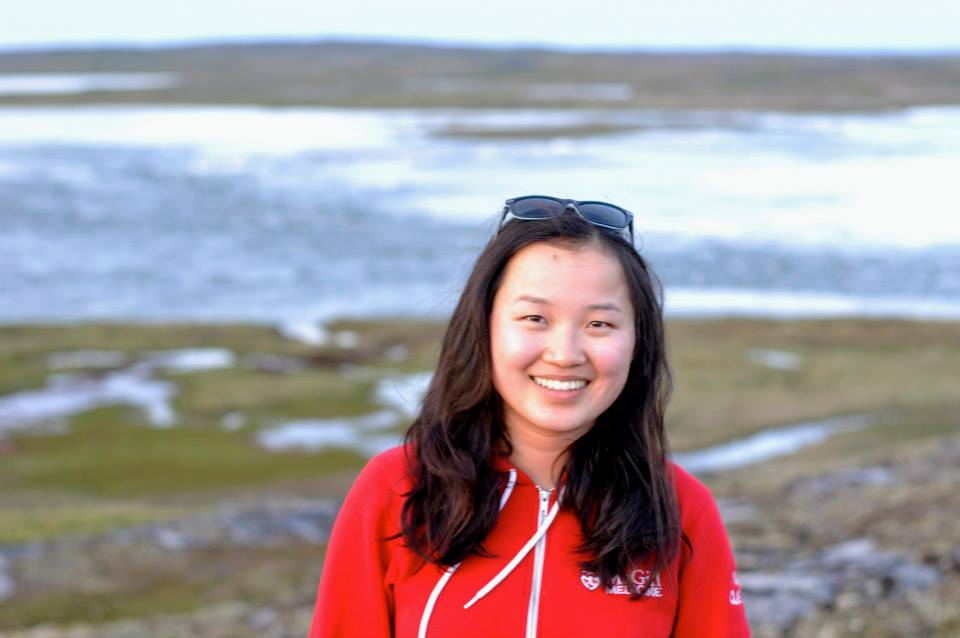 Our newly published article examines determinants of food security in Iqaluit. The article, entitled "Seasonal prevalence and determinants of food insecurity in Iqaluit, Nunavut", is published in the International Journal of Circumpolar Health.
Congratulations to the first-author, Yang Guo! Yang worked with Drs. Berrang Ford, Ford, and Harper on her fourth year honours thesis project in 2013-2014. Since then, Yang has been a medical student at McGill University. Click here for a free open-access to the article.
Our newly published article examines determinants of food security in Iqaluit. The article, entitled "Seasonal prevalence and determinants of food insecurity in Iqaluit, Nunavut", is published in the International Journal of Circumpolar Health.
Congratulations to the first-author, Yang Guo! Yang worked with Drs. Berrang Ford, Ford, and Harper on her fourth year honours thesis project in 2013-2014. Since then, Yang has been a medical student at McGill University. Click here for a free open-access to the article.
New Publication: Inuit Elders’ Perceptions of How Climate Change is Impacting Health
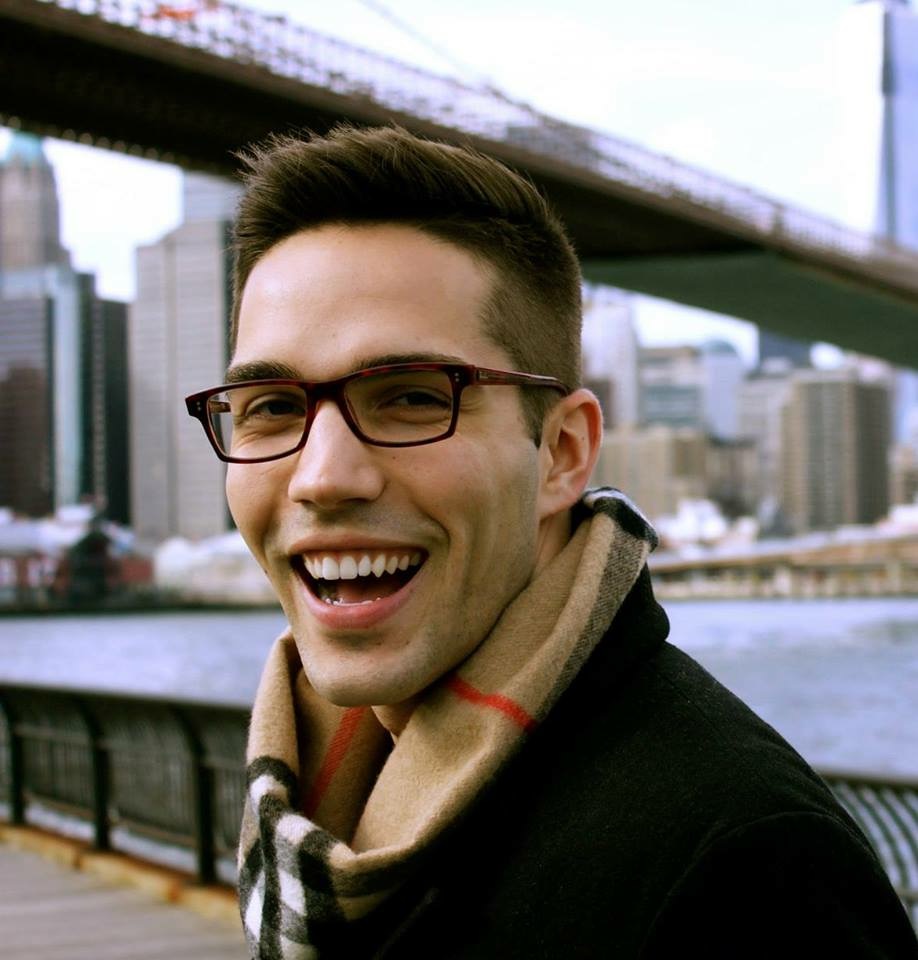 New Publication!
New Publication!
Our newly published article examines how Elders in Rigolet, Nunatsiavut observe, experience, and respond to climate change impacts on health.
The article is published in the International Journal of Indigenous Health in a Special Issue on Inuit Health and Well-Being.
Congratulations to the first-author, Josh Ostapchuk! Josh did his fourth year thesis project with Drs. Cunsolo Willox, Edge, and Harper at the University of Guelph. He recently completed his MPH at Columbia University (NYC) in in May 2015, and accepted a full-time position with Deloitte in New York City as a Healthcare Strategy & Operations Consultant.
Citation:
Joshua Ostapchuk, Sherilee Harper, Ashlee Cunsolo Willox, Victoria L. Edge, Rigolet Inuit Community Government. 2012 (published online in 2015). Exploring Elders’ and Seniors’ Perceptions of How Climate Change is Impacting Health and Well-being in Rigolet, Nunatsiavut. International Journal of Indigenous Health. 9(2): 6-24. Click here for open-access article.
Abstract:
Climate changes are rapidly intensifying and can lead to adverse global health impacts. Indigenous populations are especially vulnerable to climate change because of their dependence on the environment for cultural activities and subsistence. The voices of Inuit Elders and seniors encompass deep wisdom and history; as such, the goal of this research was to examine the perceived impacts of climate and environmental changes on physical, mental, and emotional health, as observed by Elders and seniors in the Inuit community of Rigolet, Nunatsiavut, Labrador, Canada. A mixed-methods approach was used to gather data capturing these local observations, as well as perceived impacts on community health. A community survey was administered in November 2009 (n = 75) and in-depth interviews were conducted with Elders and seniors from January to October 2010 (n = 22). Survey results indicated that Elders and seniors observing changes in weather patterns, water systems, and wildlife were more likely to perceive climate change impacts on health (p < 0.05). Emergent themes from the interviews included: recurring observations of climate change, including changes in temperature, ice, snow, and seasonal timing; impacts on physical health, including reduced physical activity levels and poorer nutrition; impacts on mental and emotional health, including feelings of isolation and depression; and an identified need for community-wide adaptation. This research emphasized the importance of understanding Elder-specific perspectives of climate-health relationships in the Canadian North to develop sustainable, culturally relevant adaptation strategies to mitigate health impacts related to climate change.
Presentations at the International Medical Geography Symposium
Kate presented her Masters thesis research on food security among the Indigenous Batwa of Kanungu District, Uganda. Her oral presentation assessed food insecurity using a mixed methods approach and her poster detailed the lived experience of food insecurity and malnutrition.
Sierra presented her undergraduate thesis research on acute gastrointestinal illness among the Batwa, as well as her work conducted as a research assistant on bednet use in Kanungu District.
Citations:
Patterson, K., L. Berrang‐Ford, S. Lwasa, D. Namanya, F. Twebaze, S. Clark, IHACC research team, and S.L. Harper. (2015). Analyzing longitudinal food security in an indigenous African population: Comparing determinants and predictors from quantitative and qualitative methods. Oral Presentation at at the International Medical Geography Symposium, Vancouver, Canada.
Patterson, K., L. Berrang‐Ford, S. Lwasa, D. Namanya, F. Twebaze, S. Clark, IHACC Research Team, and S.L. Harper. (2015) "Because eating is life": A qualitative approach to analyzing food security and malnutrition in the Batwa pygmies of Southwestern Uganda. Poster presentation at the International Medical Geography Symposium, Vancouver, Canada. Click here for poster.
Clark, S., L. Berrang‐Ford, S. Lwasa, D. Namanya, F. Twebaze, K. Patterson, IHACC research team, and S.L. Harper. (2015). Acute gastrointestinal illness in an Africa Indigenous population: the lived experience of Uganda’s Batwa. Poster presentation at the International Medical Geography Symposium, Vancouver, Canada. Click here for poster.
Update from Vivienne and Sarah in Uganda
Written by Vivienne Steele (incoming MSc student, Guelph) and Sarah MacVicar (MSc student, McGill) It’s hard to believe that we are halfway through our time in Bwindi. Things have been going very well, and we are looking forward to making the most of our last two weeks here!
We have had the opportunity to visit six communities in Kanungu District—two Bakiga and four Batwa communities. In each visit, with Saba and Grace’s guidance and translations, we heard some of the stories of childbirth and delivery from the women in the community. These powerful narratives will be guiding our research as Viv investigates antenatal attendance and Sarah looks into how climate change may affect birth outcomes in the region.
For our brief mid-trip break, we had the chance to go visit Lake Bunyonyi, a lake in the Kabale District, near the border of Rwanda, rumoured to be the second deepest lake in Africa (up to 900 m deep!). We stayed in a “geodome” style house, with an open view of the night sky. Crawfish from the lake was on the menu – as well as dodo pizza! Before leaving, we headed out on the lake for a morning paddle in a dugout canoe – beautiful, made us feel like we were back in Canada.
Other gastronomic experiences: Sarah tried jackfruit for the first time and loved them! We will definitely be having more before departing. We also had supper at the Bwindi Community Hospital’s guest house, which was a great opportunity to interact more with folks from the hospital.
We are looking forward to our remaining time here, with an upcoming visit from our supervisors Professor Berrang Ford and Professor Harper! They will be here with and with several other IHACC PI’s—Didacus Namanya, Dr. Lwasa, and Professor Ford. We will be continuing data entry at BCH and doing a few more key informant interviews as we wrap up our research over the next few weeks.
Sarah and Viv
CIHR Scholarship Winner!
Congratulations to Jacqueline Middleton on winning a prestigious CIHR scholarship! Jacqueline will be working with Drs. Harper and Cunsolo Willox on the epidemiology of mental health and wellbeing in the Arctic.
International Ambassador for the One Health EcoHealth Congress 2016 in Melbourne, Australia
PhD Student Kate Bishop-Williams has been selected as an International Ambassador for the One Health EcoHealth Congress 2016 in Melbourne, Australia. Kate was selected for her commitment to EcoHealth, as demonstrated by her roles as the president of the EcoHealth Community of Interest in Guelph, the blog manager for the Canadian Community of Practice in Ecosystem Approaches to Health, and a voice for EcoHealth on her website and Twitter feeds.
Kate’s primary roles leading up to the conference are promotion of the conference; national relationship building with vendors, sponsors and attendees; and contributing to the development of an outstanding scientific program at the Congress.
Batwa Maternal Health - Updates from Vivienne and Sarah
Written by Vivienne Steele, incoming MSc student Today is the first day of our third week here in Uganda. We arrived in Kampala and we met with partners at Makerere University and the Ministry of Health. Then, we headed to Buhoma and we have now spent more than a week here, and we have been busy! We were able to coordinate logistics of our upcoming five weeks of fieldwork, which involves conducting key informant interviews and community focus group discussions about pregnancy and delivery experiences in the region.
After catching an Aerolink flight over the impressive hills of western Uganda, we were welcomed by the staff at Green Tree Lodge, who were happy to host more visitors from IHACC. Luckily for me, I had already met the staff on my last trip, and was happy to see them again!
We started our work in Buhoma with a visit to Bwindi Community Hospital (BCH) to reconnect with staff we had worked with during our last visit. We also introduced ourselves to new and visiting staff at BCH, and were pleased to receive updates on the hospital from BCH’s executive director.
One of our data collection goals is to visit five communities (two Bakiga communities and three Batwa settlements) in the area, in order to ask questions about pregnancy and childbirth experiences. Our first three visits have gone well; it has been exciting to meet the communities we heard much about beforehand. With the guidance of our local partners, Seba and Grace, we have heard stories from community members and been able to share meals with the communities. One highlight was seeing a group of piglets running around near the community centre! (Sarah wanted to take one home).
Although the rainy season was supposed to have ended a month ago, we are still experiencing some heavy downpours! At one point, the rain hit during our walk home from BCH, and we had to run into a shop to buy an umbrella to continue on home. According to our friends here, the rains have stretched on a month longer than usual. It is also been “cold” here in the mornings, and we have taken advantage of this by going for a brief jog before the day begins!
New Article Published: Climate-sensitive health priorities in Nunatsiavut, Canada
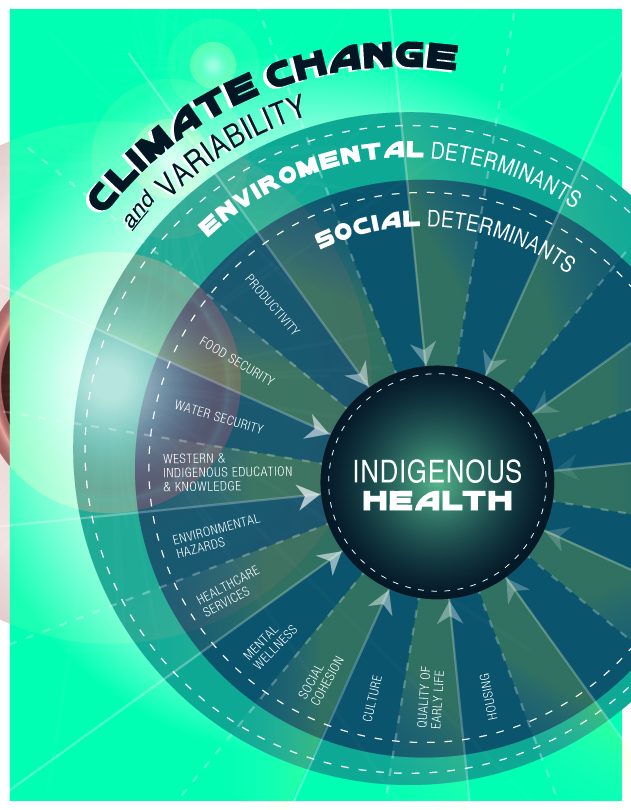 New Publication!
New Publication!
Our new published article presents the results of an exploratory study that used participatory methods to identify, characterize, and rank climate-sensitive health priorities in Nunatsiavut, Labrador, Canada.
Citation:
Harper, S.L. Edge, V.L., Ford, J., Cunsolo Willox, A., Wood, M., IHACC Research Team, Rigolet Inuit Community Government, and McEwen, S.A. (2015). Climate-sensitive health priorities in Nunatsiavut, Canada. BMC Public Health, 15:605. Click here to read the article (open access).
Abstract:
Background: This exploratory study used participatory methods to identify, characterize, and rank climate-sensitive health priorities in Nunatsiavut, Labrador, Canada.
Methods: A mixed method study design was used and involved collecting both qualitative and quantitative data at regional, community, and individual levels. In-depth interviews with regional health representatives were conducted throughout Nunatsiavut (n = 11). In addition, three PhotoVoice workshops were held with Rigolet community members (n = 11), where participants took photos of areas, items, or concepts that expressed how climate change is impacting their health. The workshop groups shared their photographs, discussed the stories and messages behind them, and then grouped photos into re-occurring themes. Two community surveys were administered in Rigolet to capture data on observed climatic and environmental changes in the area, and perceived impacts on health, wellbeing, and lifestyles (n = 187).
Results: Climate-sensitive health pathways were described in terms of inter-relationships between environmental and social determinants of Inuit health. The climate-sensitive health priorities for the region included food security, water security, mental health and wellbeing, new hazards and safety concerns, and health services and delivery.
Conclusions: The results highlight several climate-sensitive health priorities that are specific to the Nunatsiavut region, and suggest approaching health research and adaptation planning from an EcoHealth perspective.
Vivienne Attends the CoPEH Canada Workshop/Symposium/Field School
Written by Vivienne Steele
 This June, I participated in the two-week field school for Community of Practice in Ecosystem Approaches to Health Canada (CoPEH-Canada) – Communaute de pratique canadienne en approaches ecosystemiques de la santé, which was hosted by Université de Québec à Montréal (UQAM). The course, which welcomed students from Canada, Latin America and the Carribbean (CoPEH-LAC) and West Africa (CoPES-AOC), was focused on the health of the St-Lawrence river ecosystem through a 3-day workshop, a 1-day symposium and a 9-day field course organized by CoPEH.
This June, I participated in the two-week field school for Community of Practice in Ecosystem Approaches to Health Canada (CoPEH-Canada) – Communaute de pratique canadienne en approaches ecosystemiques de la santé, which was hosted by Université de Québec à Montréal (UQAM). The course, which welcomed students from Canada, Latin America and the Carribbean (CoPEH-LAC) and West Africa (CoPES-AOC), was focused on the health of the St-Lawrence river ecosystem through a 3-day workshop, a 1-day symposium and a 9-day field course organized by CoPEH.
As part of the 3-day workshop, the group organizers exposed us to a variety of topics in EcoHealth through information sharing sessions, field trip outings and reflective journal assignments. We were guided through Montreal’s Old Port to better understanding the environmental challenges facing the St-Lawrence river; such as management of used industrial waster, of drinking water distribution and of marine transport regulation in the port. At Parc des Rapides, a brief ride west of downtown, alongside the Lachine canal, we were shown some of the flora and fauna being protected around the Lachine rapids island area (snapping turtles, Great blue herons, balsam poplar, etc.). As a great complement to the day’s discussions on systems thinking, ecosystem resilience and active eco-toxicology projects in the St-Lawrence river region, we shared our “sense of place in nature” experiences through a wonderfully-led traditional sharing circle.
The day-long symposium, hosted by CoPEH field course alumni, was built upon the base topicc of ‘self-organizinsg systems’ in the context of environmental health. As the leaders encouraged us to ‘self-organize’ into groups, we had a great opportunity to network, to share, and to reach agreements on our definition of the role of self-organizing groups in environmental health research.
The nine-day field course was organized in sessions, which revolved around the six principles of EcoHealth: equity, viability, transdisciplinarity, system dynamics, participation and action. Each of the nine day involved understanding several different (and interconnected) principles through lectures, field trips and group work . One day, for example, we discussed the principles of systems thinking, transciplinarity and participation through a lecture on narratives, a field trip to Montreal’s Center for Sustainable Development (Maison du développement durable) and a group activity on social movements. A highlight of the course was the field trip to Sorel, which is a community southeast of downtown Montreal. Guided by the assigned “rich picture map” group task, we snapped photos of the day’s activities, which we were to be presented to our fellow classmates. Our photos showed the boat tour along the Yamaska river (we learned about the river system’s currents, nearby maritime trade routes, and the overall health of the shoreline), the aquatic species identification activity (we donned hip waders and dragged a heavy net through a small stream area) and lunch at a local riverside restaurant (we ate fried  perch and catfish stew from the nearby river). The day concluded with a talk on measuring contaminants and their effect on ecosystem health, and a presentation by a community conservation group whose focus is to increase public awareness of the importance of the river. Due to this day’s diverse schedule, we had managed to capture photos of many aspects of the St-Lawrence river ecosystem, and were able to organize them onto our “rich picture map”. Our map’s main feature was hourglass-shaped river sketch, onto which we organized the photos on the top or bottom of the hourglass; where the top showed a healthy, well-managed river system and the bottom showed an unhealthy, poorly-managed and deteriorating river system. In our group’s concluding presentation, we showed how good management and a community involvement can maintain the complex, healthy ecosystems as desired at the top of the hourglass. We are lucky to live so near to the St-Lawrence river ecosystem, and the time is now for us to act to maintain the health of the ecosystem.
perch and catfish stew from the nearby river). The day concluded with a talk on measuring contaminants and their effect on ecosystem health, and a presentation by a community conservation group whose focus is to increase public awareness of the importance of the river. Due to this day’s diverse schedule, we had managed to capture photos of many aspects of the St-Lawrence river ecosystem, and were able to organize them onto our “rich picture map”. Our map’s main feature was hourglass-shaped river sketch, onto which we organized the photos on the top or bottom of the hourglass; where the top showed a healthy, well-managed river system and the bottom showed an unhealthy, poorly-managed and deteriorating river system. In our group’s concluding presentation, we showed how good management and a community involvement can maintain the complex, healthy ecosystems as desired at the top of the hourglass. We are lucky to live so near to the St-Lawrence river ecosystem, and the time is now for us to act to maintain the health of the ecosystem.
While the jam-packed and excellently organized schedule allowed for participants to share knowledge and build valuable relationships, it has also left me inspired by what I have learned and the people I have met. After a couple days’ rest and reflection, I look forward to incorporating ecosystem approaches to health in my upcoming research project.

